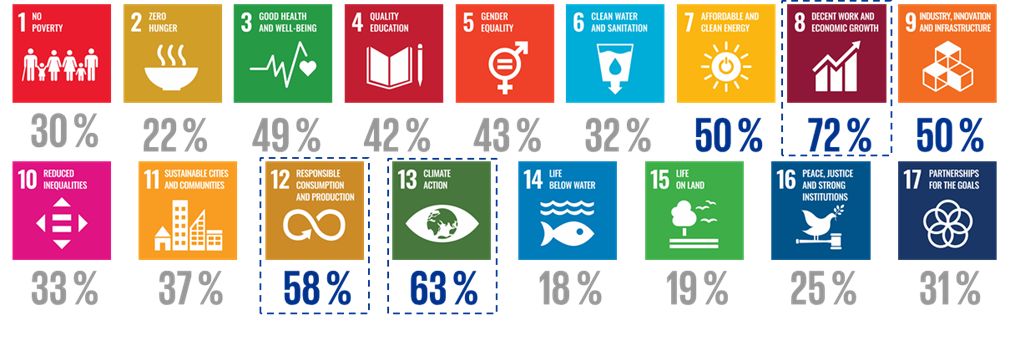KPMG recently published a global sustainability reporting survey. Norway, Iceland, Sweden, Estonia and Finland, as KPMG’s member firms, also participated in the study. In collaboration, we will write a three-part blog series in which we analyse the results of the report from the perspective of the Nordic and Baltic regions. Welcome to read and discuss. If you have any questions, please don’t hesitate to reach us.
About the UN SDGs
The 17 Sustainable Development Goals (SDGs) were introduced by the United Nations in 2015 as a blueprint to achieve a better and more sustainable future for all by addressing global challenges, including poverty, inequality, climate change, environmental degradation, peace, and justice.
While the SDGs were designed as goals for governments, the UN's 2030 Agenda for Sustainable Development specifically calls on businesses “to apply their creativity and innovation to solving sustainable development challenges …”. Cost savings and revenue opportunities, among others, are the economic benefits a company might gain from reporting on SDGs according to the Business & Sustainable Development Commission.
We are in a critical time to realize the SDGs in 2030, as stated in the 2022 Sustainable Development Goals Report. This is due to multiply interconnected crisis, predominately COVID-19, climate change and conflicts. These impact all the SDGs and actions on a global scale is required to get back on track to achieve the goals in 2030.
Reporting against SDGs
We have tracked SDG reporting since its launch in 2015. In 2017 and 2020, reporting on SDGs took large leaps, whereas we have seen only incremental growth in adoption over the past two years. In KPMG’s survey of sustainability reporting, it was found that a 2 percent increase in reporting for both the top 100 companies per country (N100) and global top 250 companies (G250). The former reaching 71% and the latter 74% in 2022 of those who report on sustainability. Considering the overall uptake on sustainability reporting of 79% for N100 and 96% for G250 the overall reporting on SDGs is significantly lower for N100 (only 56% of all N100 companies report on SDGs), than it is for G250.
Reporting against SDGs per region
In 2022, we see 12 countries, territories, and jurisdictions in which 75 percent or more of the top 100 companies reference SDGs in their sustainability reporting. Four of those are in the Asia Pacific region. Even though this strong geographical spread suggests that the SDGs are fully embedded around the world, reporting rates in Eastern Europe (61 percent) and the Middle East (65 percent) can still improve. Considering the reporting rate of 79% (N100) in Western Europe, there is a large gap on the European level on SDG reporting. This is compounded by the fact that overall sustainability reporting rates in Eastern Europe have decreased by 2% in 2022 (to 72%), whereas Western Europe's overall reporting rates have steadily increased to 85% in 2022. Similar pattern is also reflected in the UN rankings of countries progress on achieving the SDGs, where the top 10 is filled by Western Europe countries.
In the G250, 100 percent of German companies reference the SDGs. Also impressive is the increasing references to SDGs among Chinese companies, going from 5 percent of companies in 2017 to 56 percent in 2022.
Reporting against SDGs per sector
Looking at the reporting between sectors, we found that the uptake of SDGs remains strong, with the majority in all sectors are reporting against the SDGs. The top three from our previous survey (2020), TMT (Technology, Media & Telecommunications), automotive and oil & gas, still remain the highest SDG reporting sectors, with the differences that TMT (86%) has taken the lead from automotive (83%). While industrials, manufacturing & metals, which is the lowest reporting sector saw the highest increase, from 46% (2020) to 63% (2022), the financial services sector is the only sector in which reporting against the SDGs decreased, dropping from 73% in 2020 to 70% in 2022.



